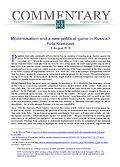Gros, D. & Alcidi, C. (2014) “The case of the disappearing Fiscal Compact“, Economic Policy – Centre for European Policy Studies (EPC) Commentary, 05 November. Following the Commission’s autumn forecast showing that only five euro-area countries exhibit a fiscal balance better than the 0.5% of GDP deficit allowed by the Fiscal Compact, Daniel Gros and Cinzia Alcidi attempt to explain in this new Commentary why there is precious little …Read More
Opinion polling leaves little doubt Podemos could break into the mainstream of Spanish politics at next year’s general election
Kennedy, P. (2014) “Opinion polling leaves little doubt Podemos could break into the mainstream of Spanish politics at next year’s general election“, LSE EUROPP, 12 November. Recent opinion polls in Spain have indicated that the left-wing Podemos (‘We Can’) party, which was only formed in January of this year, could gain the largest share of the vote in Spain’s 2015 general election. Paul Kennedy assesses the challenge the party …Read More
Towards a New Industrial Policy for Europe
Dhéret, C. & Morosi, M. with Andrea Frontini, Annika Hedberg and Romain Pardo (2014) “Towards a New Industrial Policy for Europe“, EPC Issue Paper No. 78, 12 November. EXECUTIVE SUMMARY Recent policy debates have confirmed that manufacturing forms a key pillar of the industrial sector and of our economy. However, European manufacturing has been in steady decline for decades. This trend, accelerated by the economic and financial crisis, is …Read More
Recent slowdown in global trade: Cyclical or structural
Boz, Ε., Bussière, Μ. & Marsilli, C. (2014) “Recent slowdown in global trade: Cyclical or structural“, VoxEU Organisation, 12 November. The past three years have witnessed a slowdown in global trade. This column shows that the slowdown was particularly pronounced in advanced economies, especially the Eurozone. In a panel of 18 OECD economies, most of the slowdown can be explained by cyclical factors. However, structural factors – global value …Read More
Contagion in the European sovereign debt crisis
Glover, B. & Richards-Shubik, S. (2014) “Contagion in the European sovereign debt crisis“, VoxEU Organisation, 12 November. Understanding the probability and magnitude of financial contagion is essential for policymaking. This column applies a framework for modelling financial contagion to data on the cross-holding and credit risk of sovereign debt in Europe. Credit markets perceived little risk of contagion from these spillovers following a sovereign default. It is important for …Read More
Getting The Germany Argument Right
Wren-Lewis, S. (2014) “Getting The Germany Argument Right“, Social Europe Journal, 11 November. As the Eurozone experiences a prolonged demand-deficient recession, and given Germany’s pivotal role in making that happen, it is important to get the argument against current German policy right. It seems to me there are two wrong directions to take here. The first is to argue that Germany needs to undertake fiscal expansion because it has …Read More
Mr. Europe? The Ghosts of Juncker’s Past Come Back to Haunt Him
Blome, N., Pauly, C., Peter Schmitz, G. & Schult, C. (2014) “Mr. Europe? The Ghosts of Juncker’s Past Come Back to Haunt Him“, Der Spiegel Online, 10 November. He only recently took office as European Commission president, but now, Jean-Claude Juncker is under pressure due to potentially illegal tax deals forged in Luxembourg during his stint as the country’s prime minister. Some believe he may have to resign. Jean-Claude …Read More
What caused the great recession in the Eurozone? What could have avoided it?
Martin, P. & Philippon, T. (2014) “What caused the great recession in the Eurozone? What could have avoided it?“, VoxEU Organisation, 11 November. Economists disagree over the origin of the Eurozone Crisis. This column uses a quantitative framework to sort through the various channels and policy impacts. It argues that fiscal and macroprudential policies are complements, not substitutes. Prudent fiscal policy is helpful but cannot by itself undo private …Read More
Why the EU’s commitment to preventing human rights abuses abroad is more than just rhetoric
Kreutz, J. (2014) “Why the EU’s commitment to preventing human rights abuses abroad is more than just rhetoric“, LSE EUROPP, 10 November. Is EU foreign policy genuinely influenced by humanitarian concerns or are such claims merely used to add legitimacy to traditional power politics? Joakim Kreutz uses data on EU foreign policy actions between 1989 and 2008 to assess the extent to which human rights concerns have played a …Read More
Structural Reforms Will Not Mitigate The Risk Of Deflation In Europe
Theodoropoulou, S. (2014) “Structural Reforms Will Not Mitigate The Risk Of Deflation In Europe“, Social Europe Journal, 10 November. In a speech delivered at the Central Bank of Latvia on October 17th, Benoit Coeuré, member of the executive board of the ECB and apparently one of the currently few close confidants of Mario Draghi, argued that speeding up the pace of structural reforms in the Eurozone could be key …Read More





